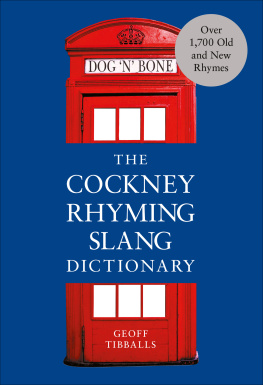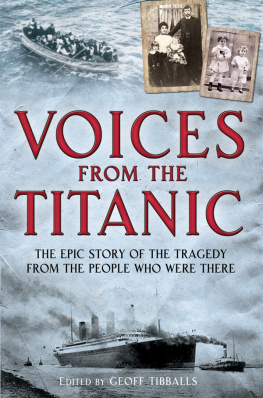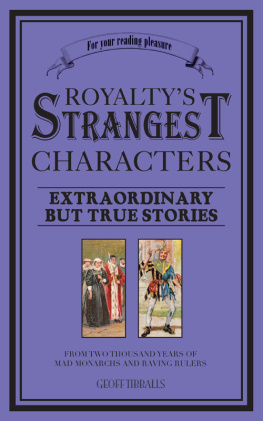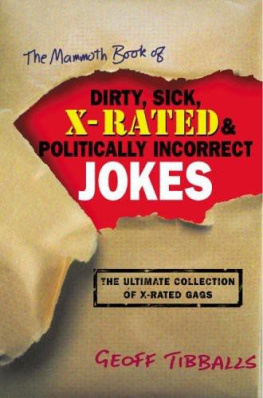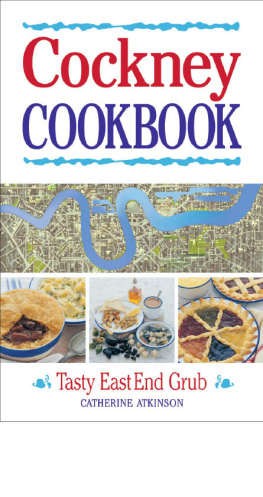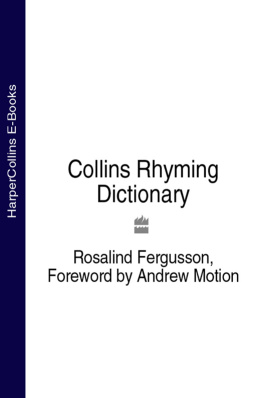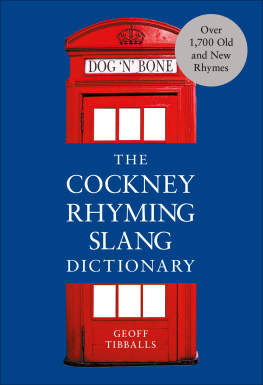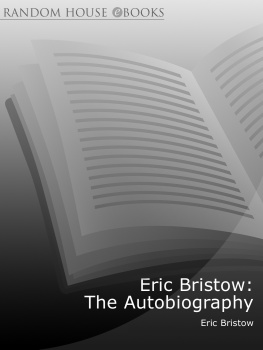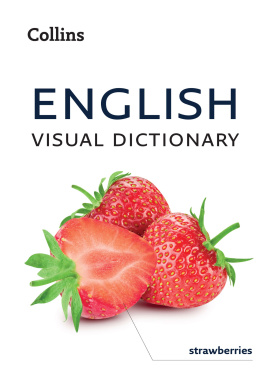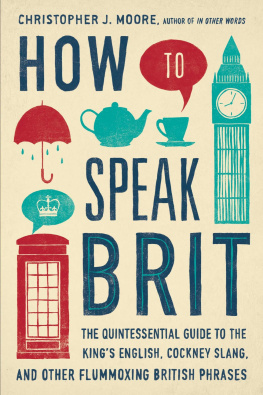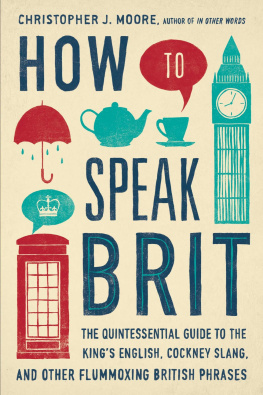
THE
COCKNEY
RHYMING
SLANG
DICTIONARY
GEOFF
TIBBALLS

Contents
About the Author
Geoff Tibballs has written over 150 books, including the
Ripleys Believe It or Not! annuals,
The Mammoth Book of Weird News, Unbelievable Facts and
The Guinness Book of Oddities. Among his claims to fame are having a rock band named after him by four people he has never met but who thought his name sounded memorable and once following former Liberal Party leader Jo Grimond up the escalator at London St. Pancras station. To my bread knife and two bottles of water
Introduction
If you ask someone outside London whether they regularly use Cockney rhyming slang, they might answer, Not on your Nellie! blissfully unaware that not on your Nellie is itself a derivative of Cockney rhyming slang, from Nellie Duff meaning puff, which is slang for life. So not on your Nellie means not on your life.
The first mention of rhyming slang is in John Camden Hottens 1859 book
The Slang Dictionary and the popularly held belief is that it was designed by criminals and shady street sellers as a secret code indecipherable to outsiders, especially the police. Over the next 100 years it was adopted by working-class Cockneys in general often to provide euphemisms for embarrassing conditions or situations.
On the following pages you will find rhymes old and new, popular and obscure, and like any self-respecting dictionary there are translations from Cockney to English and vice versa.
So if you want to know the contributions that such diverse characters as Sebastian Coe, Vera Lynn and Noddy Holder have made to the language, the meaning of quaint phrases like Oi Jimmy Knacker and tumble down the sink, the answers are all in this, the ultimate Captain Hook about Chitty Chitty Bang Bang.
Geoff Tibballs
Cockney to English
A
Adam and Eve believe
(One of the most familiar rhyming slang terms, dating from the late nineteenth century, as in, Would you Adam and Eve it, hes run off with my skin and blister!)
Adam Ants pants
Air Force sauce
Air gunner stunner
Airs and graces Epsom races, braces
(In the 1900s this term referred to Epsom races but it subsequently changed to mean the elastic straps that held up mens trousers.)
Ajax tax
(From the powerful household cleaner introduced in 1947 with the jingle: Youll stop paying the elbow tax/When you start cleaning with Ajax.)
Alan Whickers knickers
(British TV personality famous for being lampooned on
Monty Pythons Whicker Island. Usually shortened to Alans, as in the 1998 film
Lock, Stock and Two Smoking Barrels when Nick the Greek says: Alright, alright, keep your Alans on!)
Aldermans nail tail
(As in the expression as happy as a dog with two aldermen.)
Alexander the Great plate
(After the king of Macedonia (356323 BC) who spectacularly expanded his empire during his short life.)
Alfred the Great weight
(After the ninth-century King of Wessex.)
Alligator later
(As in see you later, alligator with its response of in a while, crocodile.)
Almond rocks socks
Andy Pandy shandy
(First appearing in 1950, stringed puppet Andy Pandy appeared on
Watch With Mother to the delight of thousands of pre-school children. (See also .))
Apple fritter bitter (beer)
Apple pips lips
Apples and pears stairs
(This phrase has its origins in the nineteenth century when market-stall holders would arrange their fruit in steps (or stairs) with the shiniest apples and pears at the front.)
April Fools tools, football pools
(This was originally an underworld term for a burglars tools but it was later extended to embrace the craze for doing the football pools that took off in Britain in the 1930s.)
April showers flowers
(This probably stems from the verse April showers bring forth May flowers.)
Aristotle bottle
Armitage Shank bank
(From toilet manufacturers Armitage Shanks.)
Army and Navy gravy
Ascot races braces
(Usually shortened to Ascots.)
Attila the Hun a 2:1 degree result
(The fearsome king of the Huns (406453) who died on his wedding night is fondly remembered by students, as in, Congratulations on getting an Attila; I only got a Desmond.)
Auntie Ella umbrella
Auntie Nelly belly
B
Baa lamb tram
(Electric baa lambs ran in London from 1901 to 1952 before being reintroduced in Croydon in 2000.)
Babbling brook cook, crook
Babys pram jam
Backseat driver skiver
Bacon and eggs legs
Bacon rind mind
Bag of sand grand (1,000)
Bag of yeast priest
Baked bean Queen (Elizabeth II)
Baked beans jeans
(Jeans were originally worn by cowboys, so this rhyme dating from the 1960s might spring from the association between a cowboys favourite clothing and his favourite food.)
Bakers dozen cousin
(Medieval English bakers would add an extra loaf when selling a dozen in order to avoid being fined under the terms of the Assize of Bread and Ale for giving short measure.)
Bald head red (snooker ball)
(Applied to the red ball in snooker, even though a bald head looks more like the pink.)
Ball and bat hat
(Popular in England before 1914, after which it was largely replaced by Tit for tat.)
Ball of chalk walk
Ball of lead head
(Used in the British army during the First World War but now obsolete.)
Ballet dancer chancer
Balloon car saloon bar
Balmy breeze cheese
Band of Hope soap
(The Band of Hope was a British temperance society formed in Leeds in 1847 to educate children on the perils of drink.)
Bangers and mash cash, slash (urinate)
Bar of soap Pope
Barb wired tired
Barge and tug mug (drinking)
Bark and growl trowel
Barnaby Rudge judge
(A historical novel by Charles Dickens, published in 1841 and dealing in part with the pitfalls of capital punishment. (See also .))
Barnet Fair hair
(The history of Barnet Fair dates back to 1588 when Queen Elizabeth I granted a charter to the Lord of the Manor of Barnet, Charles Butler, for the staging of a twice-yearly fair.)
Basil Fawlty Balti
(After the Torquay hotelier played by John Cleese in the classic 1970s sitcom Fawlty Towers.)
Bat and wicket ticket
Bath bun son, sun
Battle cruiser boozer (pub)
(First heard in the 1940s. bees work hard to produce honey and if humans work hard, they earn money.)
Bees wax tax
Beggar My Neighbour on the labour (exchange)
(The card game Beggar My Neighbour dates back to at least the mid-nineteenth century, having appeared in Charles Dickenss
Great Expectations (1861).)
Bell ringers fingers
Next page
